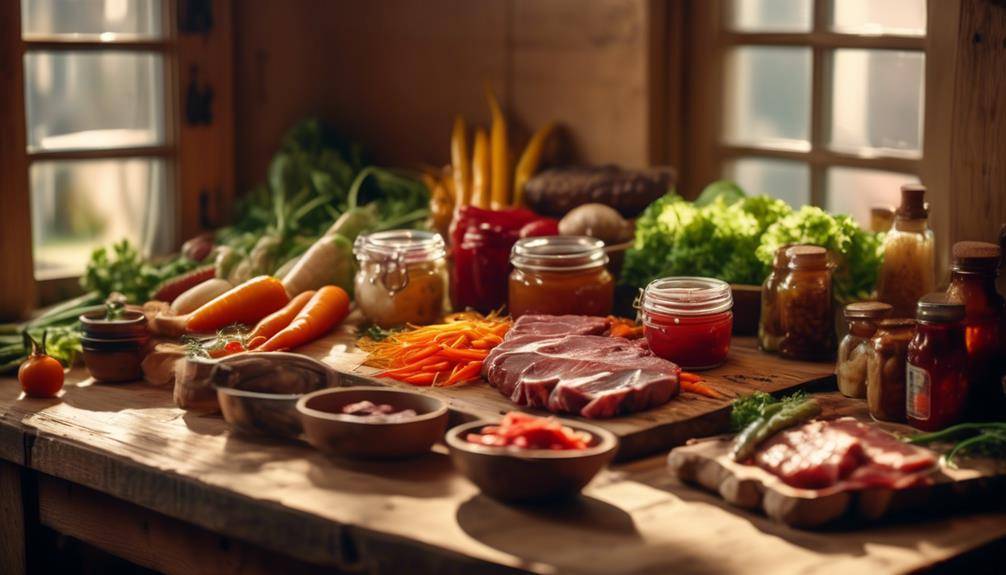The Best British Farm-To-Table Cooking

Imagine stepping into a British farm-to-table restaurant, where the culinary experience is as refreshing as a cool breeze on a summer’s day. The Best British Farm-To-Table Cooking; The enticing aroma of locally sourced ingredients wafts through the air, drawing you in. But it’s not just the tantalizing scents that captivate your senses; it’s the commitment to sustainable farming practices and supporting local farmers that sets this dining experience apart. As you take your seat, you can’t help but wonder what unique farm-to-table cooking techniques await you, along with the embrace of seasonal flavors, farm fresh produce, and the rediscovery of forgotten British ingredients.
Traditional British Cuisine
When it comes to traditional British cuisine, you’ll find a delightful blend of hearty flavors, time-honored recipes, and locally sourced ingredients that will transport you to the heart of the British countryside. Traditional British recipes have been passed down through generations, each one reflecting the regional culinary traditions of the country. From the rich stews of Scotland to the comforting pies of England, there is something for everyone to enjoy.
One iconic dish that represents traditional British cuisine is the Sunday roast. It is a hearty meal that typically consists of roasted meat, such as beef, lamb, or chicken, served with roasted potatoes, Yorkshire pudding, and a variety of vegetables. The meat is often cooked slowly, allowing it to become tender and full of flavor. This classic dish can be found in pubs and restaurants across the country and is a favorite among locals and tourists alike.
Another traditional British recipe that is popular is the fish and chips. This dish originated in the coastal towns of England and has become a staple in British cuisine. Fresh fish, usually cod or haddock, is coated in a light batter and deep-fried until golden and crispy. It is then served with thick-cut chips (fries) and a side of mushy peas. This simple yet satisfying meal is enjoyed by people of all ages and is often eaten on a Friday as a traditional end-of-the-week treat.
When exploring traditional British cuisine, you will also come across dishes like bangers and mash, shepherd’s pie, and black pudding. These recipes vary from region to region, each with its own unique twist. Bangers and mash, for example, is a classic dish from England that consists of sausages served with mashed potatoes and onion gravy. Shepherd’s pie, on the other hand, is a comforting dish made with minced meat and topped with mashed potatoes.
Locally Sourced Ingredients
When it comes to farm-to-table cooking in Britain, one of the key aspects is the use of locally sourced ingredients. This means that the food you enjoy is made with fresh, seasonal produce that is grown right here in the country. Not only does this ensure the highest quality and flavor, but it also supports sustainable food practices by reducing the carbon footprint associated with transportation.
Fresh, Seasonal Produce
Experience the vibrant flavors of farm-to-table cooking in Britain, where fresh, seasonal produce takes center stage, sourced locally to ensure the highest quality ingredients for your culinary delight. British cuisine is renowned for its commitment to using fresh, organic produce, and farm-to-table restaurants are at the forefront of this movement. From juicy tomatoes in the summer to hearty root vegetables in the winter, the changing seasons dictate the ingredients on your plate.
Imagine biting into a perfectly ripe strawberry, picked just that morning from a nearby farm. Or savoring the earthy sweetness of locally grown carrots, harvested at the peak of their flavor. With each bite, you can taste the authentic flavors of the British countryside, knowing that your meal is made with the freshest, most delicious ingredients available.
Sustainable Food Practices
As you continue to explore the world of farm-to-table cooking in Britain, you’ll discover that sustainable food practices play a crucial role in ensuring the use of locally sourced ingredients of the highest quality. One key aspect of sustainable food practices is food waste reduction. Chefs and restaurants are increasingly focused on minimizing food waste by utilizing every part of an ingredient and implementing efficient storage and preservation techniques. This not only helps to reduce environmental impact but also contributes to cost savings.
Another important practice is community supported agriculture (CSA). CSA programs connect local farmers directly with consumers, allowing them to receive regular deliveries of fresh, locally grown produce. By participating in CSA, you not only support local farmers but also ensure that you have access to the freshest ingredients available, creating a sustainable and vibrant food system.
Seasonal Menu Inspiration
Looking for inspiration for your seasonal menus? Look no further than the bountiful offerings of farm-to-table cooking in Britain. With its emphasis on using fresh, locally sourced ingredients, farm-to-table cooking is the perfect way to create seasonal menus that celebrate the best of British produce.
When it comes to menu planning, farm-to-table cooking encourages you to work with what is in season. By doing so, you not only support local farmers and reduce your carbon footprint, but you also ensure that your dishes are bursting with flavor. From vibrant spring greens to sweet summer berries, crisp autumn apples to hearty winter root vegetables, each season offers its own unique ingredients that can inspire your menu.
Incorporating farm-to-table cooking techniques into your seasonal menus can also elevate your dishes and make them truly stand out. For example, roasting vegetables brings out their natural sweetness and adds depth of flavor, while grilling meats imparts a smoky char that enhances their taste. You can also experiment with pickling, fermenting, and preserving techniques to extend the lifespan of seasonal ingredients and create interesting flavor combinations.
To truly embrace the farm-to-table philosophy, it’s important to establish relationships with local farmers and producers. This not only ensures the freshness and quality of your ingredients but also allows you to showcase the stories behind the food on your menu. By featuring the names and stories of the farmers and artisans who contribute to your dishes, you create a connection between your guests and the food they are enjoying.
Sustainable Farming Practices
When it comes to sustainable farming practices, there are three key points to consider: organic farming methods, soil health, and biodiversity, and reduced chemical usage. Organic farming methods prioritize the use of natural fertilizers and pesticides, avoiding synthetic chemicals that can harm the environment and human health. Maintaining soil health and biodiversity is crucial for sustainable farming, as it helps to maintain nutrient-rich soil and supports the natural ecosystem. Lastly, reducing chemical usage not only minimizes the impact on the environment but also ensures that the produce is healthier and safer for consumption.
Organic Farming Methods
Organic farming methods, with their focus on sustainability and environmental stewardship, have become an increasingly popular choice for farmers in Britain. These methods prioritize the use of organic fertilizers, such as compost and manure, over synthetic chemicals. By avoiding the use of chemical fertilizers, organic farmers ensure that their crops are free from harmful residues and protect the soil’s natural fertility.
Another key practice in organic farming is crop rotation, which involves alternating the types of crops grown in a particular field from season to season. This helps to minimize soil erosion, control pests and diseases naturally, and maintain soil health and biodiversity. Organic farming methods not only promote sustainable agriculture but also provide consumers with healthier, more nutritious food options while preserving the environment for future generations.
Soil Health and Biodiversity
To maintain the health and biodiversity of the soil, sustainable farming practices focus on nurturing its natural ecosystem. Soil conservation is a key aspect of these practices, as it involves preventing erosion, reducing nutrient loss, and promoting organic matter retention. By implementing techniques such as cover cropping, crop rotation, and reduced tillage, farmers can protect the soil from degradation and ensure its long-term fertility.
Additionally, sustainable farming practices also prioritize ecosystem restoration. This involves creating habitats for beneficial organisms like earthworms and bees, as well as practicing agroforestry and maintaining hedgerows to enhance biodiversity. By caring for the soil and restoring its natural balance, sustainable farming practices not only support the health of the land but also contribute to the resilience and sustainability of the entire ecosystem.
Reduced Chemical Usage
As we continue our exploration of sustainable farming practices in Britain, let’s now turn our attention to the crucial aspect of reduced chemical usage. When it comes to farming, reducing pesticide and chemical usage is not only beneficial for the environment but also for our health. Here are three reasons why reduced chemical usage is important in organic farming:
- Environmental impact: By reducing pesticide use, organic farmers minimize the negative effects on soil, water, and wildlife, promoting a healthier ecosystem.
- Health benefits: By choosing organic produce, you can reduce your exposure to harmful chemicals, promoting a healthier diet and lifestyle.
- Sustainable farming: Organic farming practices focus on natural methods of pest control, crop rotation, and companion planting, which help maintain the long-term fertility and productivity of the land.
Supporting Local Farmers
Supporting local farmers is essential for fostering a sustainable and vibrant farm-to-table cooking culture in Britain. By choosing to support local farmers, you not only contribute to the growth of the local economy but also ensure the freshest and highest quality ingredients for your meals. When you buy directly from local farmers, you become part of a movement called community supported agriculture (CSA), where individuals or families invest in local farms in exchange for a share of the harvest.
By supporting local farmers, you help create a sense of community and strengthen the bonds between farmers and consumers. You have the opportunity to build relationships with the people who grow your food, and you can gain a deeper understanding of where your food comes from and how it is produced. This connection to the land and the people who work it adds a special dimension to your farm-to-table cooking experience.
Furthermore, supporting local farmers has a positive impact on the environment. By reducing the distance that your food travels from farm to table, you help decrease carbon emissions and minimize the reliance on fossil fuels. Additionally, many local farmers prioritize sustainable farming practices, such as organic methods or regenerative agriculture, which help protect the soil, water, and biodiversity.
Farm-to-Table Cooking Techniques
By embracing farm-to-table cooking techniques, you can elevate your culinary skills and fully immerse yourself in the flavors and freshness of locally sourced ingredients. Farm-to-table restaurant trends have been gaining popularity in recent years, and for good reason. Here are three benefits of incorporating farm-to-table cooking into your repertoire:
- Enhanced Flavor: When you cook with locally sourced ingredients, you are working with produce at the peak of its freshness. Fruits and vegetables are picked at the perfect time, ensuring optimal flavor and nutritional value. The vibrant colors, crisp textures, and intense flavors will elevate your dishes to new heights, leaving your taste buds craving more.
- Sustainable Practices: Farm-to-table cooking promotes sustainability by reducing food miles and supporting local farmers. By sourcing ingredients from nearby farms, you are reducing carbon emissions associated with long-distance transportation. Additionally, you are supporting small-scale farmers who prioritize sustainable and organic farming practices, which in turn helps to protect the environment.
- Connection to Community: Farm-to-table cooking fosters a strong connection between the chef and the local community. By working directly with farmers and producers, you gain a deeper understanding of where your food comes from and the effort that goes into growing it. This connection not only adds a personal touch to your dishes but also allows you to support and celebrate the hardworking individuals who contribute to your culinary creations.
Incorporating farm-to-table cooking techniques into your repertoire not only enhances the taste of your dishes but also promotes sustainability and fosters a sense of community. So, why not take a trip to your local farmers’ market and start exploring the bountiful flavors of farm-fresh ingredients? Your taste buds and the planet will thank you.
Embracing Seasonal Flavors
To truly savor the essence of each season, embrace the vibrant flavors that nature offers at its peak. Seasonal cooking techniques allow you to make the most of these flavors and create dishes that are not only delicious but also highlight the best of what each season has to offer. Whether it’s the sweet and juicy strawberries of summer, the earthy mushrooms of autumn, or the hearty root vegetables of winter, there are endless creative recipe ideas that can be explored.
During the summer months, take advantage of the abundance of fresh fruits and vegetables. Grill some ripe peaches and serve them with a dollop of creamy Greek yogurt and a drizzle of honey for a simple and refreshing dessert. Or try making a vibrant tomato and basil salad, using the ripest tomatoes you can find, along with fragrant basil leaves and a splash of balsamic vinegar.
In the fall, embrace the cozy and comforting flavors of the season. Roast some butternut squash and blend it into a velvety soup with a hint of warming spices like cinnamon and nutmeg. Or experiment with different varieties of mushrooms and create a hearty mushroom risotto, using rich vegetable broth and Parmesan cheese to enhance the earthy flavors.
As winter sets in, turn to hearty and nourishing dishes. Whip up a batch of creamy mashed potatoes using colorful root vegetables like purple potatoes and parsnips. Or try roasting a whole chicken with a medley of winter vegetables, such as carrots, turnips, and Brussels sprouts, for a satisfying one-pan meal.
Farm Fresh Produce and Herbs
Farm fresh produce and herbs bring a burst of flavor and vibrancy to your farm-to-table cooking, elevating your dishes to a whole new level of freshness and taste. Whether you are dining at one of the many farm-to-table restaurants in Britain or enjoying a meal at home, incorporating farm fresh ingredients is a surefire way to enhance the quality of your culinary creations. Here are three reasons why farm fresh produce and herbs are a must-have in your kitchen:
- Unparalleled freshness: When you use farm fresh produce, you can taste the difference. The fruits and vegetables are harvested at the peak of their ripeness, ensuring optimal flavor and nutrition. The herbs are picked just before being used, ensuring their aromas and flavors are at their strongest. This level of freshness simply cannot be matched by store-bought produce.
- Supporting local farmers: By utilizing farm fresh produce, you are not only enjoying the best that nature has to offer, but you are also supporting local farmers and their communities. Farm-to-table restaurants and urban farming initiatives are on the rise in Britain, and by choosing to use these ingredients, you are contributing to the sustainability and growth of these initiatives.
- Endless variety: Farm fresh produce and herbs offer a wide range of flavors and textures, allowing you to experiment and create unique dishes. From heirloom tomatoes bursting with juiciness to fragrant basil leaves that add a pop of freshness, the possibilities are endless. By incorporating these ingredients into your cooking, you can take your dishes to new heights and impress your family and friends with your culinary skills.
Rediscovering Forgotten British Ingredients
Rediscovering British ingredients that have been forgotten over time adds a sense of intrigue and nostalgia to your culinary repertoire. Exploring these forgotten ingredients not only allows you to connect with the rich history of British cuisine but also opens up a world of unique flavors and textures. From ancient grains to uncommon herbs, these ingredients offer an exciting opportunity to revive traditional cooking techniques and create dishes that celebrate the essence of British gastronomy.
One forgotten British ingredient that is making a comeback is the heritage vegetable varieties. These heirloom vegetables, such as the purple carrot and the yellow beetroot, have distinctive flavors and vibrant colors that add depth and character to your dishes. By incorporating these forgotten vegetables into your cooking, you can bring a touch of nostalgia to your table while also supporting local farmers who are dedicated to preserving these traditional varieties.
Another forgotten ingredient worth rediscovering is the lesser-known cuts of meat. In the past, British households made use of every part of the animal, resulting in a variety of cuts that are now often overlooked. From oxtail to pig’s trotters, these cuts offer rich and robust flavors that can be enhanced through slow cooking methods like braising and stewing. By embracing these forgotten cuts, you not only add depth to your dishes but also contribute to reducing food waste and supporting sustainable farming practices.
Rediscovering forgotten British ingredients also provides an opportunity to experiment with traditional cooking techniques such as preserving and fermenting. Preserving fruits and vegetables through pickling or making jams and chutneys allows you to extend their shelf life while intensifying their flavors. Fermenting ingredients like cabbage into sauerkraut or making your own vinegar adds complexity and tanginess to your dishes. These age-old techniques not only enhance the taste of your food but also connect you to the culinary traditions of the past.
Incorporating forgotten British ingredients into your cooking not only adds a sense of intrigue and nostalgia but also supports local farmers and promotes sustainable and traditional cooking practices. So why not embark on a culinary adventure and rediscover the treasures of British gastronomy?
The Best British Farm-To-Table Cooking; Frequently Asked Questions
Can You Provide a List of the Most Popular Traditional British Dishes?
Sure, here’s a list of the most popular traditional British dishes. From fish and chips to roast beef and Yorkshire pudding, these seasonal recipes incorporate local ingredients, showcasing the best of British farm-to-table cooking.
How Do Local Farmers Benefit From the Farm-To-Table Movement?
Local farmers benefit from the farm-to-table movement in various ways. By selling their produce directly to restaurants or consumers, they experience an economic impact, earning a fair price for their products. Additionally, the movement fosters community support, as people appreciate the freshness and quality of locally sourced ingredients.
Are There Any Specific Cooking Techniques Used in British Farm-To-Table Cooking?
In British farm-to-table cooking, specific techniques are used to emphasize the freshness and quality of the ingredients. From roasting to braising, these cooking methods bring out the natural flavors and highlight the principles of farm-to-table dining.
Can You Recommend Any Recipes That Incorporate the Flavors of the Current Season?
You can incorporate the flavors of the current season into your everyday cooking by using fresh, local ingredients. Supporting local farmers not only benefits the community, but also ensures you are getting the best quality produce.
What Are Some Forgotten British Ingredients That Are Being Rediscovered in Farm-To-Table Cooking?
In farm-to-table cooking, forgotten British ingredients are being rediscovered. These unique flavors and ingredients are making a comeback, adding depth and nostalgia to modern dishes. Embrace the trend and explore the rich culinary heritage of Britain.
Conclusion
In conclusion, British farm-to-table cooking offers a beautiful blend of traditional flavors and sustainable practices. By using locally sourced ingredients and embracing seasonal flavors, chefs are able to create dishes that are fresh, flavorful, and truly representative of the region. With an emphasis on supporting local farmers and rediscovering forgotten British ingredients, this culinary movement is not only delicious but also beneficial for the environment and the community. So next time you sit down to enjoy a meal, consider indulging in the wonderful world of British farm-to-table cuisine.








